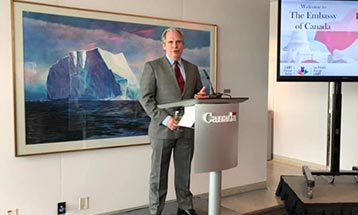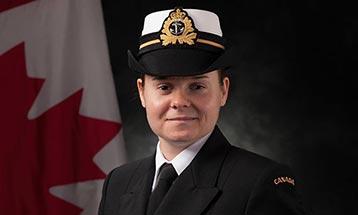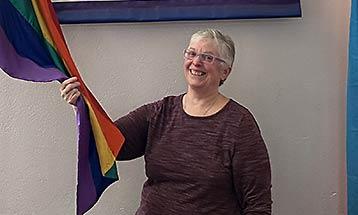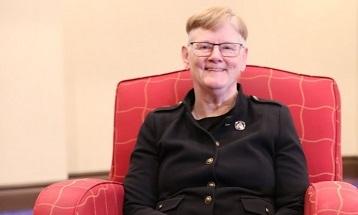What made Todd Ross a success in the Navy led to success after service
Todd Ross had loved the military since childhood. As an adult, he excelled in his position in the Royal Canadian Navy—until he was dismissed in 1990, through no fault of his own, caught up in the LGBT purge.
Since then, Todd has applied his considerable talents and skills to build an impressive career. He also helped lead the class action that led to an apology to LGBT members and compensation.
A life in the military
Todd Ross joined the Army Cadets in his home town of St. Stephen, New Brunswick, just before his thirteenth birthday. “I absolutely loved it,” he remembers. The Cadets took him to Germany, among other adventures. When he got older, he became a summer instructor with the organization.
He joined the Canadian Armed Forces (CAF) immediately after high school as a Naval Combat Information Officer. He was first based in CFB Cornwallis, Nova Scotia, then on HMCS Saskatchewan in Esquimalt, British Columbia. “I went all over the west coast, from Ecuador to Alaska and Hawaii,” Todd recalls.
Todd served enthusiastically—for a year. Then he came to the attention of the CAF’s special investigation unit. When he came out in 1990, “that closed the book,” he says. After 18 “extremely stressful months,” he was informed that he would “not have a career in the Canadian military.”
“It was not a great ending,” he recalls.
Todd received an honourable discharge, but was not eligible for benefits or services from Veterans Affairs Canada.
He took the opportunity to backpack across Europe working as a waiter or in retail stores. Eventually, he worked his way up to retail management.
In the mid-1990s, Todd was living in Toronto and started working for his Member of Provincial Parliament, who eventually became Ontario Minister of Health and Long-Term Care. “I found myself in the health care field,” Todd sums up.
In 2017, Todd joined the class-action lawsuit seeking redress for the military’s long-time purge of LGBT members. “Large numbers of people who had been purged were living with mental health and addictions issues,” he says. “People began seeking help after a long period of not doing so, of struggling on their own.”
He remembers “the idea of belonging, the pride of being a Veteran, participating in Remembrance Day activities, and re-connecting with the military family.” But at the same time, “it resurfaced feelings and memories that hurt.”
Todd became one of the lead complainants in the class-action, which won an apology from the Prime Minister and monetary compensation for members. “I was extremely impressed by how cooperative the Government of Canada, the Federal Court and the Prime Minister’s Office were. The Court came to a decision in two years—that’s record speed.”
The Federal Court’s decision and the Prime Minister’s apology had a huge impact on the Veteran community. “It was recognition that many people had lived with the shame of being kicked out of the military,” Todd says. “It was an opportunity to heal and move forward.”
More importantly, the settlement meant that LGBT members who were purged can now receive VAC benefits and services.
In the community
Today, Todd is a public affairs consultant with a thriving business. In 2019, he and his partner, Kirk MacKenzie, returned to New Brunswick, where they bought a house that has a view of the ocean, close to Todd’s parents. They have two dogs, a Yorkie named Tommy and a Pomeranian named Frankie.
He is also busy with his local community: Chair of the Charlotte County Fall Fair; President of the Charlotte County Pride; and a board member of the Charlotte County Museum as well as the Town of St. Andrews Environment Committee. Nationally, he serves on the LGBT Purge Fund Board and is Chair of the Rainbow Veterans of Canada. As if that’s not enough, he has also taken up curling, when possible given pandemic restrictions.
“It’s been easy to settle back into rural life and being involved in many organizations has been a great way to meet people in the community and to have some input on what’s happening,” he says.
Tips for release from military service
Todd has some advice for current CAF members whose release could be as far away as two years.
The work ethic instilled in the military is an asset, as is knowing how to work as a member of a team. “Understand the importance of what you do in a team,” he says.
Members approaching release should take advantage of any help and programs available from VAC and DND. “Take advantage of your skills, and look for employment that values them. Even though your post-service career will not be the same as what you did during service, your skills and experience still have value.”
Todd also stresses the importance of maintaining connections to other Veterans. “Use social media to maintain connections to your military family,” he says. “They can really help you.”
Note: Rainbow Veterans of Canada was one of over 40 organizations that recently received funding from the Veterans Organizations Emergency Support Fund. The Fund helps recipients cover operational costs like rent, utilities, administration, and wages, allowing them to continue to deliver important services for Veterans and their families throughout the global pandemic.





